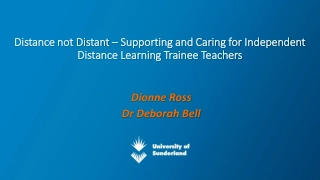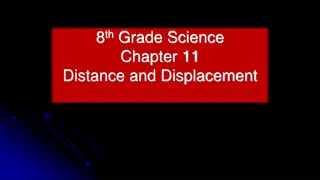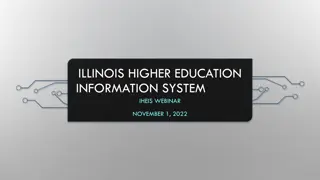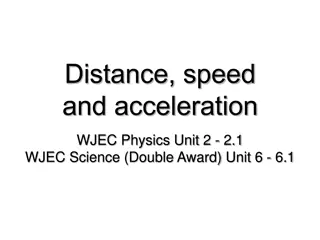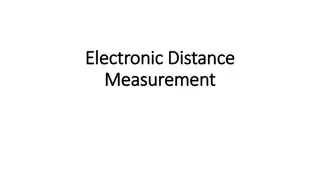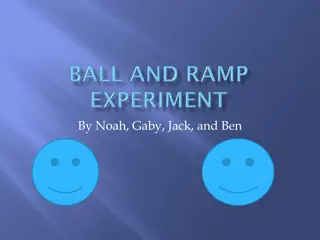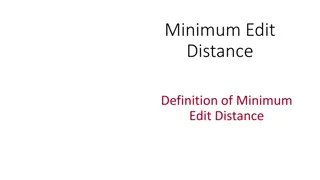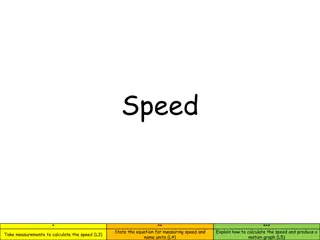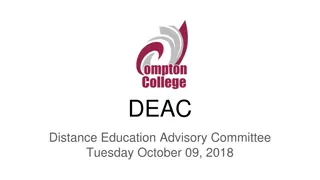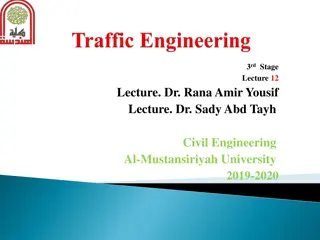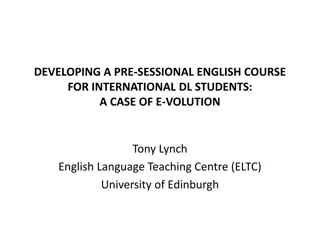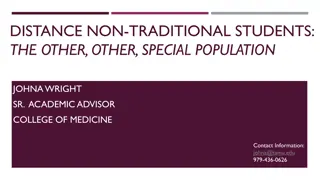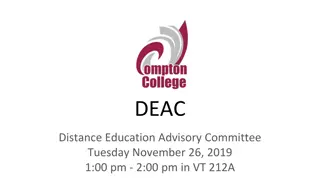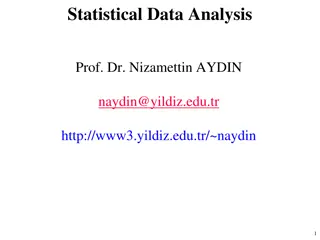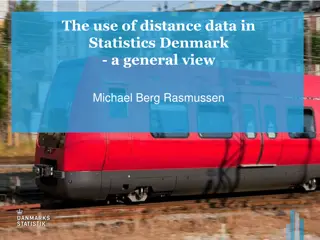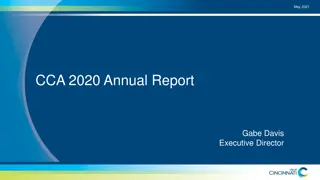Distance Education Trends and Data Analysis for 2020-21 Academic Year
Explore the trends and statistics in distance education for the academic year 2020-21, including modalities like online, hybrid, and broadcast education. The report covers aspects such as emergency transitions to online learning, YCCD courses and sections by modality, and total FTES for distance education.
Download Presentation

Please find below an Image/Link to download the presentation.
The content on the website is provided AS IS for your information and personal use only. It may not be sold, licensed, or shared on other websites without obtaining consent from the author. Download presentation by click this link. If you encounter any issues during the download, it is possible that the publisher has removed the file from their server.
E N D
Presentation Transcript
2020-21 Distance Education Report
Instruction in which the instructor and student are separated by distance and interact through the assistance of communication technology Online- A course that uses web-based tools and in which 100% of the instruction and interaction is done online Distance Education Defined Hybrid: A course that replaces some, but not all, face-to-face class time with web-based tools Broadcast Education: One-way and two- way transmissions through open broadcast, closed circuit, cable, broadband lines, or wireless communications devices
Emergency Transition to Distance Education 2020 Mid-March Move to Online Two Day Training and Support for Transition System Office Support for Online Support Software and Services DE Emergency Addendum Approvals Emergency Withdrawal Period Extended
YCCD Courses by Modality 2020-21 87 415 239 84 2019-20 662 123 4 23 2018-19 666 115 8 15 0% 10% 20% 30% 40% 50% 60% 70% 80% 90% 100% Face to Face Online Hybrid Broadcast Education 4 Source: YCCD Answers-MOAR 320 Report and XTALY
YCCD Sections by Modality 2020-21 156 1,483 392 124 2019-20 2,213 371 4 38 2018-19 2,302 346 8 25 0% 10% 20% 30% 40% 50% 60% 70% 80% 90% 100% Face to Face Online Hybrid Broadcast Education 5 Source: YCCD Answers-MOAR 320 Report and XTALY
Sections by Modality 2020-21 116 893 304 44 2019-20 1,427 271 3 19 2018-19 1,531 265 1 16 0% 10% 20% 30% 40% 50% 60% 70% 80% 90% 100% Face to Face Online Hybrid Broadcast Education Source: YCCD Answers-MOAR 320 Report and XTALY
Sections by Modality 2020-21 40 590 88 80 2019-20 786 100 1 19 2018-19 771 81 7 9 0% 10% 20% 30% 40% 50% 60% 70% 80% 90% 100% Face to Face Online Hybrid Broadcast Education Source: YCCD Answers-MOAR 320 Report and XTALY
YCCD Distance Education-Total FTES 6,000.00 5,000.00 2,177.57 4,000.00 3,000.00 2,000.00 3,508.27 318.30 1,000.00 249.55 880.29 866.57 0.00 2018-19 2019-20 2020-21 Yuba College Woodland Community College 8 Source: YCCD Answers-MOAR 320 Report and XTALY
Distance Education-Total FTES 3,000 2,669 2,500 2,000 1,500 1,000 829 822 764.74 500 74.03 43.07 39.10 8.53 5.33 0 2018-19 2019-20 2020-21 Online Hybrid Broadcast Education Source: YCCD Answers-MOAR 320 Report and XTALY
Distance Education-Total FTES 1,800 1,645.46 1,600 1,400 1,200 1,000 800 600 400 311.80 297.50 231.80 220.31 200 15.90 9.35 8.40 4.90 0 2018-19 2019-20 2020-21 Online Hybrid Broadcast Education Source: YCCD Answers-MOAR 320 Report and XTALY
2020-21 Census Enrollment by Ethnicity and Modality 30,000 28,524 25,000 20,000 15,000 10,830 10,000 8,463 5,344 5,000 2,163 1,949 955 870 769 557 199 143 90 90 0 Distance Education Face-to-Face Overall Latinx Asian Black or African American White All Others Unknown/Uncollected Source: YCCD Answers Enrollment Term to Term Report and XTALY
2020-21 Success by Ethnicity and Modality 100% 90% 79% 76% 80% 74% 74% 74% 73% 72% 72% 71% 69% 66% 66% 70% 64% 62% 60% 50% 40% 30% 20% 10% 0% Distance Education Face-to-Face Overall Latinx Asian Black or African American White All Others Unknown/Uncollected Source: YCCD Answers Enrollment Term to Term Report and XTALY
2020-21 Census Enrollment by Ethnicity and Modality 20000 18,116 18000 16000 14000 12000 10000 9,134 8000 6000 4,574 4000 2,406 2000 954 668 493 380 265 111 69 21 14 13 0 Distance Education Face-to-Face Overall Latinx Asian Black or African American White All Others Unknown/Uncollected Source: YCCD Answers Enrollment Term to Term Report and XTALY
2020-21 Success by Ethnicity and Modality 100% 90% 81% 80% 74% 71% 68% 68% 70% 65% 61% 60% 51% 50% 50% 50% 50% 47% 50% 45% 40% 30% 20% 10% 0% Distance Education Face-to-Face Overall Latinx Asian Black or African American White All Others Unknown/Uncollected Source: YCCD Answers Enrollment Term to Term Report and XTALY
Efficiency (FTES/FTEF) of All Credit Courses by Academic Year and Modality Target Efficiency (FTES/FTEF) 13.5 16.0 15.1 14.6 14.0 12.9 12.7 12.3 11.9 11.7 12.0 11.3 10.4 10.0 8.0 6.0 4.0 2.0 0.0 2018-2019 2019-2020 2020-2021 Overall Distance Education Face-to-Face Source: YCCD Answers Enrollment Term to Term Report and XTALY
Efficiency (FTES/FTEF) of All Credit Courses by Academic Year and Modality Target Efficiency (FTES/FTEF) 13.5 16.0 14.8 13.5 14.0 12.7 12.7 12.6 12.6 12.6 12.3 12.0 10.0 9.1 8.0 6.0 4.0 2.0 0.0 2018-2019 2019-2020 DE 2020-2021 Overall Face to Face Source: YCCD Answers-MOAR 320 Report
2020-2021 Participation in Distance Education by Ethnicity All Yuba College Yuba Distance Education 7.7%3.0% 7.8%2.9% 37.9% 38.5% 32.3% 31.0% 15.9% 16.8% 3.1% 3.1% Latinx Asian Black or African American White All Others Unknown/Uncollected Latinx Asian Black or African American White All Others Unknown/Uncollected Source: YCCD Answers-Enrollment Term to Term Report
2020-2021 Participation in Distance Education by Ethnicity All Woodland Community College Woodland Distance Education 4.9% 4.9% 5.9% 5.9% 46.1% 46.0% 26.9% 27.1% 13.9% 2.3% 13.8% 2.3% Latinx Asian Black or African American White All Others Unknown/Uncollected Latinx Asian Black or African American White All Others Unknown/Uncollected Source: YCCD Answers-Enrollment Term to Term Report
2020-2021 Participation in Distance Education by Service Area 0.5% Top Five Counties from Outside Service Area 14.9% County Sacramento Placer Butte Solano Nevada Count 311 164 158 78 55 % 32.5% 17.1% 16.5% 8.2% 5.8% 84.6% Service Area Outside Service Area Unknown Source: Answers-Enrollment Term to Term and STAR
2020-2021 Participation in Distance Education by Service Area 0.7% Top Five Counties from Outside Service Area 13.6% County Count % Sacramento Solano Butte Placer Alameda 312 161 76 74 22 37.9% 19.5% 9.2% 9.0% 2.7% 85.7% Service Area Outside Service Area Unknown Source: YCCD Answers-Enrollment Term to Term and STAR
Instructional Design Resource Faculty supporting faculty 95 Fulltime and part time faculty completed online certification training Peer Online Course Review (POCR), ensure course quality Distance Education Highlights Student Readiness Workshops eLearning studio for media production of online learning. Awarded Improving CTE Online Pathways Grant Entrepreneurship certificate Courses aligned to CVC rubric Incorporation of OER Successful Emergency Transition to DE
Professional Development 24 Faculty Members Completed an Online Teaching and Design Course 23 Faculty Members Completed 508 Section D Accessibility Training 16 Faculty Completed Peer Online Course Review (POCR) Training Friday Drop-in Meetings for One-on-One Support CTE Online Program Pathways Grant Progress Distance Education Highlights Fully Online Programs in: Agriculture Business Additional Support for DE Course Review Onboarding of New Instructional Design Resource Faculty Led Professional Development Provided Course Design Support Senate-backed Participation in the California Virtual Campus Online Education Initiative (CVC-OEI) Consortium
Distance Education Handbook Distance Education Activities Membership in California Virtual College, CVC Membership in Online Educational Initiative, OEI Ongoing Professional Development Opportunities Updated CANVAS dashboard with repository of resources Instructional Design Resource Faculty
Distance Education Handbook Revisions Expanded Use of Canvas Including Broadcast Messages Distance Education Activities Online Tutoring Support Implemented to Extend Hours of Service Implementing a Teaching and Learning Center to Provide Support and Professional Development Expanding DE Support Software and Services Through CVC-OEI



